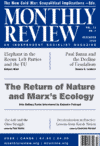
December 2020 (Volume 72, Number 7)
The United States is now in a New Cold War with Russia and China, with the focus increasingly on the latter and involving a direct challenge to U.S. hegemony over the world economy. | more…

The United States is now in a New Cold War with Russia and China, with the focus increasingly on the latter and involving a direct challenge to U.S. hegemony over the world economy. | more…

In an interview with Alejandro Pedregal, John Bellamy Foster tells us about the paths great ecosocialist thinkers traveled, the most prominent debates in current Marxist ecological thought, and the urgent need for a project that transcends the conditions that threaten the existence of our planet today. | more…
European left parties have, over the last couple of decades, become increasingly critical of political developments in the European Union, particularly as a response to the austerity policies that followed the financial crisis of 2007–08 and the subsequent euro crisis. These were accompanied by high and sustained unemployment and promises of a social pillar that never materialized. Nevertheless, even if criticism of the European Union has sharpened, this has not been well reflected in the political strategies of the left. | more…
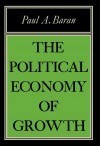
Recently published and estimated historical data illustrate that economic surplus declined during the thirteenth and fourteenth centuries in England, helping explain the “crisis of feudalism” that started in the thirteenth century. It was not until several centuries later, when capitalism became the dominant economic system, that the economic surplus began to rise on a consistent basis, due to the reinvestment of a portion of the surplus into productive activities, a greater ratio of capital income to rental income, and a greater ratio of investment to economic surplus. | more…
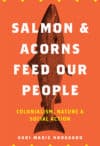
Fundamental to Kari Marie Norgaard’s Salmon and Acorns Feed Our People is the seizure of land most evident in the overtly violent era of state-sanctioned frontier genocide and forced relocation of the Karuk. Settler colonialism, Norgaard reminds us, is an ongoing state-led project up to this day—it is not just a moment relegated to the past and, thus, the inherent treatment of Native Americans as relics of U.S. history must be challenged. | more…

Both Toni Gilpin’s The Long Deep Grudge and Michael Goldfield’s The Southern Key offer ample evidence that the grand era of U.S. labor history scholarship is not yet past. The Long Deep Grudge is in equal parts labor history and family reminiscence as Gilpin seeks the fuller story of her father, who played a leadership role in the United Auto Workers union. The Southern Key is in many ways a study of a different variety, but very much of a similarly militant kind. Goldfield, a labor activist veteran himself, draws the big picture of what he sees as the central failure of the U.S. left: the failure to organize the South. | more…
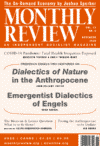
In this issue of Monthly Review, we publish two articles marking the two-hundredth anniversary of the birth of Frederick Engels. In the attempt to address our planet’s ecological crisis, Engels’s work has once acquired a renewed importance. His analysis of the dialectics of nature was to play a formative role in the development of modern ecological and evolutionary views and is now being rediscovered in that context. | more…

Today, two hundred years after his birth, Frederick Engels can be seen as one of the foundational ecological thinkers of modern times. Engels’s contributions to our understanding of the overall ecological problem remain indispensable, rooted in his own deep inquiries into nature’s universal metabolism. It is because of the very comprehensiveness of his approach to the dialectic of nature and society that Engels’s work can help clarify the momentous challenges facing humanity in the Anthropocene epoch and the current age of planetary ecological crisis. | more…

In grasping emergent qualities and laws on various levels of organization of matter, dialectical theory employs its own conceptual structure, scientific language, and investigation method, and takes a categorially open-ended shape. In this context, Engels provides a remarkable illustration that not only argues for the interconnection and interpenetration of distinct spheres such as chemistry and biology, but also draws on a generative feature of self-organizing systems. | more…

As stated in the United Nations Universal Declaration of Human Rights, health is a fundamental human right. However, we find ourselves in the midst of the COVID-19 pandemic with a shortage of both human and material health resources, most of which must be sourced from the private sector. Some of the wealthiest countries—France, Italy, Spain, the United Kingdom, and the United States—have proved unable to respond rapidly. The evolution of public health over the past four decades, during which government health policies have reduced health services to commodities and objects of speculative investment, has led to the current crisis. | more…

The story of the consumer’s involvement in the sphere of production is not new, as consumers have been providing unpaid labor to and otherwise subsidizing capitalism since at least the mid–twentieth century. Yet, as the economy has evolved so too have the scope and complexity of consumer work. | more…
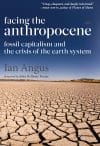
Scientific knowledge and debates in Anthropoene science have developed over the years, particularly in the two main fields involved: geology, which has mainly been concerned with formally defining the new epoch; and Earth System science, which studies the global biological, chemical, and physical changes that are reshaping the conditions of life on this planet. | more…
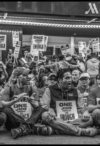
In his book Chicano Communists and the Struggle for Social Justice, Enrique M. Buelna examines the life of Ralph Cuarón, a Mexican-American or Chicano seaman, furniture maker, father, husband, and lifelong activist who joined the Communist Party at age 19 during the Second World War. The Communist Party, however, largely ignored Mexican workers and local members were not pleased with his organizing of that segment of the working class. In the early twenty-first century, the Mexican question remained, although it became known as the “Latino question” after considerable immigration from Central America in the 1980s and ’90s. In their book The Latino Question: Politics, Labouring Classes, and the Next Left, Armando Ibarra, Alfredo Carlos, and Rodolfo D. Torres deconstruct the word Latino, arguing that it homogenizes an extremely diverse population. | more…